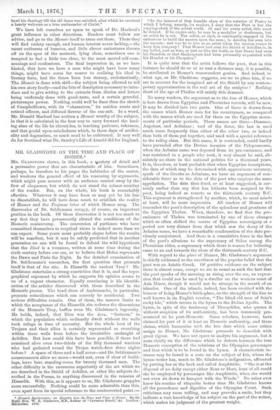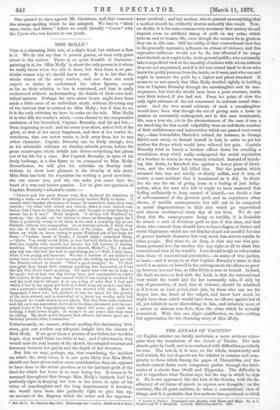MR. GLADSTONE ON THE TIME AND PLACE OF HOMER.*
Mx. GLADSTONE shows, in this book, a mastery of detail and a persuasive power that are characteristic of him. Sometimes, perhaps, he transfers to his pages the habitudes of the orator, and weakens the general effect of his reasoning by arguments, which might pass muster with an audience carried away by the flow of eloquence, but which do not stand the calmer scrutiny of the reader. But, on the whole, his book is remarkably effective. Whatever it may have been or may yet be his fate to disestablish, he will have done much to establish the reality of Homer and the Trojan= labor of which Homer sang. The discoveries of Dr. Schliemann occupy, of course, an important position in the book. Of these discoveries it is not too much to say that they have permanently altered the conditions of the Homeric controversy. The conversion of partisans who have committed themselves to sceptical views is indeed more than we can expect. Some years must probably elapse before the results will be manifest, but it may be safely predicted that in another generation no one will be found to defend the wild hypothesis that the Iliad is a romance, written at some time during the sixth century before our era, or to believe that Helen represents the Dawn and Paris the Night. In the detailed examination of Dr. Schliemann's researches, the first question that presents itself is that of the site. Is Hissarlik the ancient Troy? Mr. Gladstone entertains a strong conviction that it is, and the topo- graphical argument by which he supports his opinion seems to us of a cogent character. Equally convincing is his identifi- cation of the articles discovered with those described in the Homeric poems. The head-dress of Andromache, in particular, presents coincidences which can scarcely be accidental. Two serious difficulties remain. One of them, the narrow limits to which the acceptance of the Hissarlik site reduces the dimensions of the Homeric Troy, baffles even Mr. Gladstone's ingenuity. He holds, indeed, that Ilion was the am), " fastness," in which the population which ordinarily dwelt without the walls took refuge in time of necessity. But the whole host of the Trojans and their allies is certainly represented as crouching within these walls from before the irresistible onslaught of Achilles. But how could this have been possible, if there had remained alive even two-thirds of the fifty thousand warriors who had gathered round the Trojan watch-fires three nights before? A space of three and a half acres—and Dr. Schliemann's measurements allow no more—would not, even if clear of build- ings, leave bare standing-room for twenty thousand men. The other difficulty is the enormous superiority of the art which we see described in the Shield of Achilles, or other like subjects de- scribed in the Poems, to anything discovered in the remains of Hissarlik. With this, as it appears to us, Mr. Gladstone grapples more successfully. Nothing could be more admirable than this, even apart from its special reference to the controverted point:— • Homeric Synchronism: an Enquiry into the Time and Place of Horner. By the Bight Hon. W. E, Gladstone, M.P., Anther of "Javentas Mandl," &c. London : liscanillan. 1876.
"In the interest of that humble class of the votaries of Poetry to which I belong, namely, its readers, I deny that the Poet is but the copying-clerk of the actual world. Of and for every artist, this must be denied. If he copies only, he may be a modeller or draftsman, but an artist be is not. The artist, as such, is continually engaged in the endeavour to build the unseen upon the seen ; to develop the seen into the unseen ; and woe be to him as an artist when the unseen ceases to- keep him company That Homer had seen his Shield of Achilles is, in my belief, just as true, or just as like the truth, as that Dante had seen his Paradise, or that Shakespeare had been personally acquainted with his Hamlet or his Cleopatra."
It is quite true that the artist follows the poet, that in this instance he should do so at so vast a distance may, it is possible, be attributed to Homer's transcendent genius. And indeed, in what age, as Mr. Gladstone suggests, are we to place him, if we are to account for the imagined art of the Shield by any contem- porary approximation in the real art of the sculptor ? Nothing short of the age of Phidias will satisfy this demand.
To many readers, the argument as to the time of Homer, whisk is here drawn from Egyptian and Phoenician records, will be new. It may be divided into two parts. One of these is drawn from the names which Homer uses for his countrymen, as compared with the names which are used for them on the Egyptian monu- ments of particular periods. These names are three—Danaans, Argeians, and Achaians ; and of the three, the last is used much more frequently than either of the other two, or indeed than both of them put together, and used with a special reference to the ruling class. But this name, it is contended, could hardly have prevailed after the Dorian invasion of the Peloponnesus, when the Achaian name was deposed from its pre-eminence, and was restricted to a people who took, it may almost be said, ab- solutely no share in the national politics for a thousand years. It is, therefore, at least probable that when Egyptian inscriptions, the date of which may be determined with approximate accuracy,. speak of the Greeks as Achaians, we have an argument of con- siderable force as to the date of the poet who employs the same appellation. The date thus fixed, or at least suggested, is cer- tainly earlier than any that has hitherto been assigned to the poet, being indeed as remote as the thirteenth century B.C. This argument is strengthened by another, which, to most minds at least, will be more impressive. All readers of Homer will remember the poet's description of the splendour and greatness of the Egyptian Thebes. When, therefore, we find that the pre- eminence of Thebes was terminated by one of those changes, which so often shifted the centre of Egyptian sovereignty at a period not very distant from that which saw the decay of the- Achaian name, we have a remarkable confirmation of the date pre- viously conjectured. And there is a cumulative force in the fact of the poet's allusions to the supremacy of Sidon among the Phoenician cities, a supremacy which there is reason for believing came to an end towards the close of the thirteenth century B.C.
With regard to the place of Homer, Mr. Gladstone's argument is chiefly addressed to the overthrow of the popular belief that the poet was an Asiatic Greek. Of positive evidence on the subject there is almost none, except we are to count as such the fact that the poet speaks of the morning as rising over the sea, an expres- sion that could not be used by a dweller on the western coast of Asia Minor, though it would not be strange in the mouth of an islander. One of the islands, indeed, has been credited with the honour of being Homer's birth-place, on the strength of the line so well known in its English version, "The blind old man of Scio's rocky isle," which occurs in the hymn to the Delian Apollo. The hymn, in spite of the testimony of Thucydides, who quotes it without suspicion of its authenticity, has been commonly pro- nounced to be post-Homeric. Some scholars, however, have- claimed for part of it at least an Homeric authorship, and these claims, which harmonise with the late date which some critics assign to Homer, Mr. Gladstone proceeds to demolish with great vigour. We have not space to analyse his argument, but it rests chiefly on the difference which he detects between the true Homeric conception of the relations of the Olympian personages. and that which is to be found in the hymn. A characteristic in- stance may be found in a note on the subject of Iris, whom the hymn-writer has, much to Mr. Gladstone's indignation, affronted by putting her at the beck and call of Amphitrite. " She is at the disposal of no deity except either Zeus or Here, least of all could she be employed by personages like Amphitrite, when she would not even sit down to banquet with the Winds." No usher ever knew his routine of etiquette better than Mr. Gladstone knows all the precedence and dignities of the Olympian Court. Such criticisms may seem trifling, and may provoke a smile, but they indicate a vast knowledge of his subject on the part of the writer, which makes his judgment of the greatest weight.
One quarrel we have against Mr. Gladstone, and that concerns the strange spelling which he has adopted. We had to "think once, twice, and thrice," before we could identify " Cures" with the Cyrus who was known to our youth.



































 Previous page
Previous page